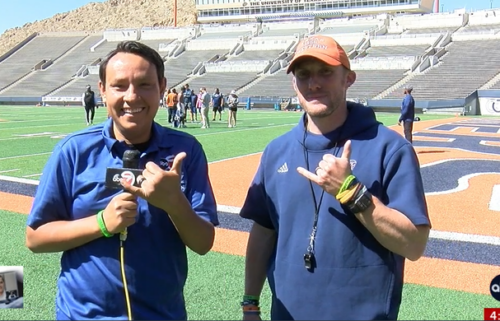Grant Wahl: A charming, kind and talented journalist
CNN
By Don Riddell, CNN
It was 5 a.m and I couldn’t sleep; my mind was replaying the extraordinary drama of Argentina’s penalty shootout victory over the Netherlands, over and over again.
And then I checked my phone. I thought I was going to throw up.
The American soccer journalist Grant Wahl, who’d also been covering the game at Lusail, had died.
At first, social media was full of concerned rumors, but then came the horrifying confirmation. It all seemed so sudden, and too bizarre, to be true.
Grant had been tweeting about the match, he’d posted about the improbable stoppage-time Dutch equalizer which took the match into extra time. But then, as more than 80,000 fans were absorbed by the drama on the field, Grant was fighting for his life. As we now know, frantic efforts to revive him were tragically unsuccessful.
If my own personal experience is anything to go by, for many of the journalists covering the World Cup in Qatar, the hours since then have been a surreal and nauseating blur.
Introducing LeBron to the world
I can’t remember the first time that I met Grant. It might have been in New York for Jurgen Klinsmann’s appointment as the US soccer team’s head coach in 2011, or maybe we’d never actually met in person until this World Cup in Qatar.
But such is the nature of our business that we have circled each other’s orbits and interacted so often over social media and through our televised interviews that we became friends.
On many occasions, our conversations would take place over Skype or Zoom, and I can vividly recall one occasion when his wife, Celine, accidentally walked into the room and almost stepped out in front of a global audience. He deftly waved her away without breaking his stride.
In subsequent years, the epidemiologist Dr. Celine Gounder would become one of the public faces of the scientific fightback against Covid 19, and he was rarely able to conceal his pride of her achievements. He was gushing about her to me just two weeks ago.
As a writer for Sports Illustrated, Wahl quickly made his name, introducing the then High School athlete LeBron James to the world with one of his many cover stories and the headline, “The Chosen One.” Just hours after he’d passed, NBA great James led the tributes to Wahl, lamenting, “It’s a tragic loss. It’s unfortunate to lose someone as great as he was.”
But it was as a soccer writer that Wahl truly made his name. He was a cheerleader for the beautiful game in North America, long before it was fashionable — a decade before the English Premier League became a regular Saturday morning staple in many American households and some Major League Soccer stadiums drew crowds of more than 70,000.
The acclaimed British football commentator Jon Champion told me that when he crossed the Atlantic to join ESPN in 2019, Wahl was the first to roll out the red carpet. “He was selling the idea of soccer in the United States,” he said. “He was almost a missionary in that sense, he would travel around the globe, telling people to take American soccer seriously. If you ask any of the frontline European football journalists who their first port of call has been if they wanted a story in America, it would be Grant Wahl.”
It’s for this reason that both the US Soccer Federation and Major League Soccer paid their respects in such glowing terms. Wahl was as important as any player in growing the game in America.
The tributes on Saturday were so fulsome that nobody could be in any doubt about his impact. “I’m not sure people outside of the United States understand Grant’s impact on football there,” tweeted the British football broadcaster Max Rushden, “I certainly didn’t until I read the tributes.”
But there was so much depth to Grant, as he wasn’t just a reporter who wrote about wins and losses. He was fearless in his pursuit of the truth, and he routinely shone an uncomfortably bright light on the darker side of professional sports highlighting human rights abuses, and speaking up for those voices who had been silenced.
In 2011, just months after FIFA’s controversial decision to award the current World Cup to Qatar, he campaigned to be elected as the new President, promising to rid soccer’s world governing body of corruption, “Let’s cure FIFA of its [Sepp] Blatter infection,” he famously promised.
He was a constant thorn in FIFA’s side, and once in Qatar he seemed to be a magnet for controversy. When collecting his media accreditation at the start of the tournament, he took a photo of the tournament logo on the wall. He reported that he was approached by security officials, and inexplicably asked to delete the image from his phone. Several days later, I found myself at the same venue, remarking to my colleagues on the now infamous ‘Wahl wall.’
Ahead of the US’ first match against Wales, he was asked to remove a rainbow t-shirt that he’d worn as a discreet show of support for the LGBTQ community. It was only after he’d been detained by stadium security and ordered to remove it (he refused) that he went public with the story.
A couple of days later, we both attended the same Thanksgiving Lunch at the Iconic Torch Hotel, and later that night, at 1:30 a.m, he joined us live in our Doha studio. He was keen to appear on the show, but was so busy that this was the only slot he had available.
Ahead of the interview, he described his new freelance business venture, GrantWahl.Com, and shared that he was concerned that he might not break even on the trip. He also told us he had been setting himself aggressive targets to deliver content for his paying subscribers.
The condensed land mass of the Qatar World Cup has given both journalists and fans the unique opportunity to attend multiple games every day, but the condensed schedule, boasting three or four games every 24 hours for 17 straight days, has been exhausting. Nevertheless, many have found the smorgasbord of action to be irresistible.
We have subsequently learned that Wahl became sick during the tournament, something he says he had come to expect after covering so many World Cups in the past. He’d been to the medical clinic at the World Cup media center, he could feel the tightening of his chest and feared it was bronchitis, he said in an episode of the podcast Futbol with Grant Wahl.
But on that night, we were joking about the fact that on only day five of the tournament, I’d lost my voice. Qatar wasn’t his first ‘rodeo,’ but it has been my first World Cup in person, and my body had quickly surrendered to the flight across eight time zones and the punishing schedule.
But when I think back to that interview, it featured so many of the things that many of us came to love about Grant. He was charming, kind and just so happy to be covering his eighth men’s World Cup and the game he loved. We discussed the t-shirt escapade, Cristiano Ronaldo’s latest antics, and the imminent clash between Team USA and England.
“There’s a search for respect from the US,” he explained, a search for validation from a country which has historically looked down its nose at the growth of the same game with a different name across the pond. But he knew that the tide was now turning and attitudes are changing.
As is the case with life itself, there is always a time limit for an interview, and we had neared the end. Needing a quick line to wrap it up and toss back to the main studio, I thanked Grant and told him it would be “interesting to see what happened next.”
None of us could ever possibly have imagined that the next chapter in his extraordinary life and career would be so suddenly, and awfully, final.
The-CNN-Wire
™ & © 2023 Cable News Network, Inc., a Warner Bros. Discovery Company. All rights reserved.




